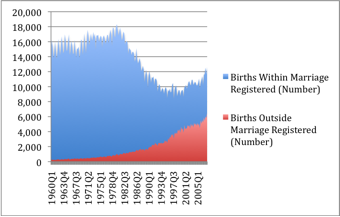Ireland in 2050: The Death of Feminism

Let’s talk about the future.
Feminism is going to die in the next 40 years. By 2050, equal rights, legal protection, and social equality for women will have been enshrined in Irish law and, more importantly, in the Zeitgeist, for three generations or more.
In 2009, we are now as far away from 1970 as we are from the year 2050. Think about the changes in material conditions, in workplace treatment, in opportunities (and in threats) women have seen over those 40 years. Now think about how much further women have to go to reach the goal feminist thinkers and practitioners have set their movement–and the answer is ‘not far’.
Yes, there are still many mountains to climb, especially on treatment of women in the home, on society’s attitudes to rape, divorce, and on some aspects of labour law enforcement. The end–equal rights and legal protection–seems a long way off. Progress by the feminist movement has been steady over the last 40 years, and in fact has gathered momentum. And 40 years is a long time to climb those mountains. So it seems reasonable to ask what will replace feminism when its key battles have been won, and when those women empowered by the movement over the 40 years to 2050 take their places in the highest echelons of Irish society come to make the decisions for the nation and ask: what comes next?
Since 1970, as women’s participation and relative importance in the workforce have increased, in particular, reaching close to the same levels of income, position, and status, as men, a tectonic shift has taken place in attitudes to domestic work. There’s nothing new here, we have been aware of this change in Irish society for many years. The Celtic Tiger years brought increased labour market participation by women to new heights–and the current downturn is not affecting participation rates as badly as you might think. Women who work are here to stay, and today, most women in their twenties, when asked, do expect to work and provide for themselves.
This changing of the traditional roles between the sexes over the next 40 years could lead to a reappraisal of the role of men in the upbringing of children, changing the norm that the woman usually receives custody of the child in a divorce case as men assert their rights in the rearing of children.
Michael Kimmel, author of The Gendered Society claims that school-aged children who do housework with their fathers are more likely to get along with their peers, and have more friends. Looking forward to 2050, it’s easy to imagine a Father’s day gift being something simple, like breakfast in bed, and all Dad’s chores done for him for the day. He might also like some chocolates. The average father in the US now spends about three hours interacting with his school-aged children per weekend day, up significantly from estimates in earlier decades. At the same time, a father’s interactions with their children remain shaped by older expectations about what men and women should do, so as the modern men proliferate, older versions of what it means to be ‘manly’ might simply die out. Androgyny will be the rule, alpha males the exception.
Marriage in Ireland, once the key to social status, security, and children, is today more focused on the status-giving aspects than the religious or childrearing functions the institution was traditionally associated with. Women simply don’t need marriage for those reasons anymore. Childrearing has changed too: within a generation, the average number of children per woman has declined by 1.3 (from 3.5 to 2.2), and though we have just experienced a population (and a marriage) boom over the last two years as the graph shows, the long term trend in births per woman is in fact downward. The component of the graph swinging upward (in red) is the number of births registered outside marriage.
 Figure 1: Births within and without marriage, 1960-2008. Source: www.cso.ie.
Figure 1: Births within and without marriage, 1960-2008. Source: www.cso.ie.
Many of the biggest changes in the next century, at least in the developed world, will be driven by the demographic tilt away from children and towards the elderly. A snapshot of a family gathering in 2050 will show lots of gray hair, and not too many nappies. Even now, for the first time in history, the average German, the average American and the average Japanese has more parents living than children. In an impoverished Ireland, the family will take centre stage again in the provision of eldercare, especially among the poor, with state and private supports spread throughout the community.
Remember, 40 years is a pretty long time — almost anything can happen. A long term economic decline in Ireland, coupled with an explosion in health care needs by a cohort of older citizens could force more people to depend on families instead of the state, in fact returning us partially to the situation which prevailed in the 1950s and before. A religious revival could restore traditional mores, returning the Catholic Church to its preeminent position in Irish cultural life. A revised calculation of rational interest in light of social chaos could call the benefits of extreme individualism into question, and perhaps roll back some of the gains won by the feminist movement, giving the movement a reason to live again.
Stephen Kinsella's book 'Ireland in 2050' is available now.
